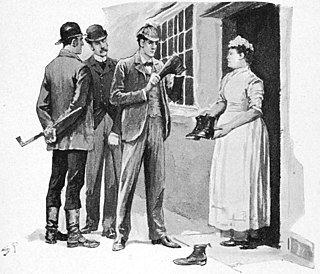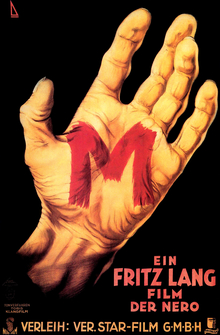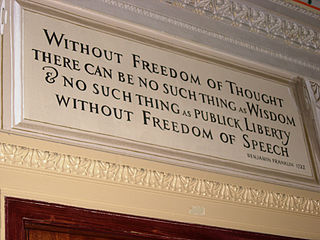
Detective fiction is a subgenre of crime fiction and mystery fiction in which an investigator or a detective—whether professional, amateur or retired—investigates a crime, often murder. The detective genre began around the same time as speculative fiction and other genre fiction in the mid-nineteenth century and has remained extremely popular, particularly in novels. Some of the most famous heroes of detective fiction include C. Auguste Dupin, Sherlock Holmes, and Hercule Poirot. Juvenile stories featuring The Hardy Boys, Nancy Drew, and The Boxcar Children have also remained in print for several decades.

M is a 1931 German mystery suspense thriller film directed by Fritz Lang and starring Peter Lorre in his third screen role as Hans Beckert, a serial killer who targets children. An early example of a procedural drama, the film centers on the manhunt for Lorre's character, conducted by both the police and the criminal underworld.

A whodunit or whodunnit is a complex plot-driven variety of detective fiction in which the puzzle regarding who committed the crime is the main focus. The reader or viewer is provided with the clues to the case, from which the identity of the perpetrator may be deduced before the story provides the revelation itself at its climax. The investigation is usually conducted by an eccentric, amateur, or semi-professional detective.
Blind spot or Blindspot may refer to:

Crime fiction, detective story, murder mystery, mystery novel, and police novel are terms used to describe narratives that centre on criminal acts and especially on the investigation, either by an amateur or a professional detective, of a crime, often a murder. It is usually distinguished from mainstream fiction and other genres such as historical fiction or science fiction, but the boundaries are indistinct. Crime fiction has multiple subgenres, including detective fiction, courtroom drama, hard-boiled fiction, and legal thrillers. Most crime drama focuses on crime investigation and does not feature the courtroom. Suspense and mystery are key elements that are nearly ubiquitous to the genre.
In the dystopian novel Nineteen Eighty-Four (1949), by George Orwell, the word thoughtcrime describes a person's politically unorthodox thoughts, beliefs, and doubts that politically contradict the tenets of Ingsoc, the dominant ideology of Oceania. In the official language of Newspeak, the word crimethink describes the intellectual actions of a person who entertains and holds politically unacceptable thoughts; thus the government of The Party controls the speech, the actions, and the thoughts of the citizens of Oceania.
Illegal, or unlawful, typically describes something that is explicitly prohibited by law, or is otherwise forbidden by a state or other governing body.
In the English language, a conspirator is a party to a conspiracy. In a criminal conspiracy, each alleged party is a "co-conspirator".

Crime films, in the broadest sense, is a film genre inspired by and analogous to the crime fiction literary genre. Films of this genre generally involve various aspects of crime and its detection. Stylistically, the genre may overlap and combine with many other genres, such as drama or gangster film, but also include comedy, and, in turn, is divided into many sub-genres, such as mystery, suspense or noir.

Freedom of thought is the freedom of an individual to hold or consider a fact, viewpoint, or thought, independent of others' viewpoints.
A crime is an act that violates the law, though the word sometimes describes anti-social behaviors outside of a legal context.
Sedition and seditious libel were criminal offences under English common law, and are still criminal offences in Canada. Sedition is overt conduct, such as speech and organization, that is deemed by the legal authority to tend toward insurrection against the established order: if the statement is in writing or some other permanent form it is seditious libel. Libel denotes a printed form of communication such as writing or drawing.
A criminal is a person who commits a crime.
Public Enemy is an American hip hop group.

Pre-crime is the idea that the occurrence of a crime can be anticipated before it happens. The term was coined by science fiction author Philip K. Dick, and is increasingly used in academic literature to describe and criticise the tendency in criminal justice systems to focus on crimes not yet committed. Precrime intervenes to punish, disrupt, incapacitate or restrict those deemed to embody future crime threats. The term precrime embodies a temporal paradox, suggesting both that a crime has not yet occurred and that it is a foregone conclusion.
The Thought Criminals were an influential and enterprising Australian punk band based in Sydney. They formed in late 1977 and disbanded in late 1981. The "angular, fast and quirky punk rock" of the Thought Criminals "was a fixture in the burgeoning Sydney underground scene." The band's name was derived from the concept of 'thoughtcrimes' from George Orwell's book, Nineteen Eighty-Four. The Thought Criminals exemplified the do-it-yourself punk ethos of the late 1970s, with which they combined considerable business acumen. The band members formed the Doublethink record label and agency which provided recording and live performance opportunities for other new bands.
Doublethink is a process of indoctrination in which subjects are expected to simultaneously accept two conflicting beliefs as truth, often at odds with their own memory or sense of reality. Doublethink is related to, but differs from, hypocrisy.
In George Orwell's dystopian novel Nineteen Eighty-Four, Newspeak is the fictional language of Oceania, a totalitarian superstate. To meet the ideological requirements of Ingsoc in Oceania, the Party created Newspeak, which is a controlled language of simplified grammar and restricted vocabulary designed to limit the individual person's ability to think critically or to articulate subversive concepts, such as personal identity, self-expression, and free will. In Oceania, such thoughts are thoughtcrimes that contradict Ingsoc orthodoxy.
Nineteen Eighty-Four is a dystopian social science fiction novel and cautionary tale by English writer George Orwell. It was published on 8 June 1949 by Secker & Warburg as Orwell's ninth and final book completed in his lifetime. Thematically, it centres on the consequences of totalitarianism, mass surveillance and repressive regimentation of people and behaviours within society. Orwell, a democratic socialist, modelled the authoritarian state in the novel on the Soviet Union in the era of Stalinism, and Nazi Germany. More broadly, the novel examines the role of truth and facts within societies and the ways in which they can be manipulated.






